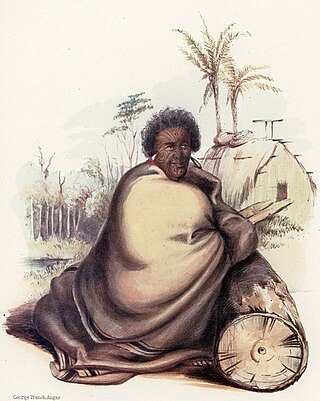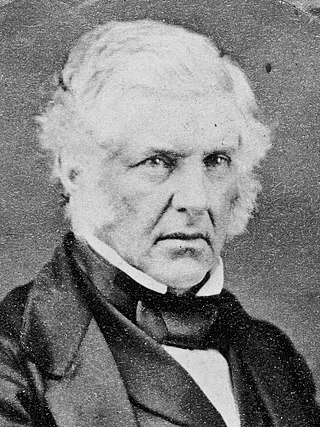Notes
- ↑ "Grey and Bell Election". Taranaki Herald . 2 June 1860.
| | This New Zealand election-related article is a stub. You can help Wikipedia by expanding it. |
The 1860 Grey and Bell by-election was a by-election held on 28 May during the 2nd New Zealand Parliament in the Taranaki electorate of Grey and Bell.
The by-election was caused by the resignation of the incumbent MP Charles Brown.
The by-election was won by Thomas King.
King was unopposed, and was duly declared elected. [1]

The New Zealand Wars took place from 1845 to 1872 between the New Zealand colonial government and allied Māori on one side, and Māori and Māori-allied settlers on the other. They were previously commonly referred to as the Land Wars or the Māori Wars, while Māori language names for the conflicts included Ngā pakanga o Aotearoa and Te riri Pākehā. Historian James Belich popularised the name "New Zealand Wars" in the 1980s, although according to Vincent O'Malley, the term was first used by historian James Cowan in the 1920s.
The First Taranaki War was an armed conflict over land ownership and sovereignty that took place between Māori and the New Zealand government in the Taranaki district of New Zealand's North Island from March 1860 to March 1861.

Sir Francis Dillon Bell was a New Zealand politician of the late 19th century. He served as New Zealand's third Minister of Finance, and later as its third Speaker of the House. The town of Bell Block near New Plymouth – on land Bell bought from the Puketapu iwi in 1849 – is named after him, as is Bell Street, Whanganui. Bell's son, Francis Henry Dillon Bell, became the first New Zealand born Prime Minister in 1925.
The 2nd New Zealand Parliament was a term of the Parliament of New Zealand. It opened on 15 April 1856, following New Zealand's 1855 election. It was dissolved on 5 November 1860 in preparation for 1860–61 election. The 2nd Parliament was the first under which New Zealand had responsible government, meaning that unlike previously, the Cabinet was chosen by Parliament rather than by the Governor-General of New Zealand.
Charles Brown was a New Zealand politician from the Taranaki area.

The Māori King Movement, called the Kīngitanga in Māori, is a Māori movement that arose among some of the Māori iwi (tribes) of New Zealand in the central North Island in the 1850s, to establish a role similar in status to that of the monarch of the British colonists, as a way of halting the alienation of Māori land. The Māori monarch operates in a non-constitutional capacity with no legal or judicial power within the New Zealand government. Reigning monarchs retain the position of paramount chief of several iwi and wield some power over these, especially within Tainui.

Pōtatau Te Wherowhero was a Māori warrior, leader of the Waikato iwi, the first Māori King and founder of the Te Wherowhero royal dynasty. He was first known just as Te Wherowhero and took the name Pōtatau after he became king in 1858. As disputes over land grew more severe Te Wherowhero found himself increasingly at odds with the Government and its policies.

James Crowe Richmond was a New Zealand politician, engineer, and an early painter in watercolours of the New Zealand landscape.
Taranaki was a New Zealand parliamentary electorate that existed for three periods between 1881 and 1996. It was represented by nine Members of Parliament.
Omata was a New Zealand electorate. It was located in Taranaki and based on the township of Omata. One of the original 24 electorates, it existed from 1853 to 1870.
Grey and Bell was a Taranaki electorate in the New Zealand Parliament from 1853 to 1881.
Wanganui and Rangitikei is a former parliamentary electorate that existed from 1853 to 1860. It was represented by two Members of Parliament.
The Southern Division was a New Zealand parliamentary electorate in the Auckland Province from 1853 to 1860. It was a large two-member electorate south of the town of Auckland.
The 3rd New Zealand Parliament was a term of the Parliament of New Zealand. Elections for this term were held between 12 December 1860 and 28 March 1861 in 43 electorates to elect 53 MPs. Two electorates were added to this during this term, Gold Fields District and a new Dunedin electorate created by splitting the existing City of Dunedin into Dunedin and Suburbs North and Dunedin and Suburbs South, increasing the number of MPs to 57. During the term of this Parliament, six Ministries were in power.

Thomas King was a 19th-century New Zealand politician. He served in the 1st and 2nd Parliaments, and was otherwise active in New Plymouth. He was one of the first settlers, coming out on the first ship to New Plymouth in 1841.

William Cutfield King was a 19th-century New Zealand politician who was elected to Parliament, but was killed in the New Zealand Wars before the first session.
The Grey and Bell by-election 1856 was a by-election held in the Grey and Bell electorate during the 2nd New Zealand Parliament, on 14 October 1856, and was, along with the Christchurch Country 1856 by-election, the second equal contested by-election in New Zealand political history.
The Grey and Bell by-election 1858 was a by-election held in the Grey and Bell electorate during the 2nd New Zealand Parliament, on 17 May 1858, and was, the second by-election in the electorate.

The 1865 Town of New Plymouth by-election was a by-election held in the Town of New Plymouth electorate during the 3rd New Zealand Parliament, on 19 May 1865. The by-election was caused by the resignation of the incumbent, Charles Brown, and was won unopposed by Henry Sewell. Whilst Sewell was not a local resident, he was a member of the government through his appointment to the Legislative Council, the upper house of Parliament. Sewell accepted the invitation to represent the electorate, as him becoming a member of the lower house was seen to strengthen the government.
The 1861 Grey and Bell by-election was a by-election held on 20 June during the 3rd New Zealand Parliament in the Taranaki electorate of Grey and Bell.